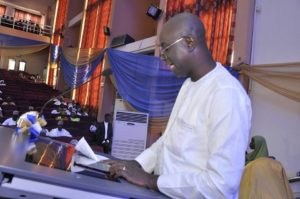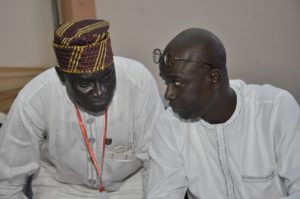
By Olusegun Adeniyi
In this book, The Ambali Years, which I read for the first time last night after arriving Ilorin, even though it took me just about two hours to complete, Mr Kunle Akogun has done an important work. By documenting the impactful five-year tenure on this campus, of Professor AbdulGaniyu Ambali, he has provided a concise and enjoyable narrative that offers insights into the workings of one of the most sought-after offices within the academic community in Nigeria.
Right from the first chapter, the author transports the reader back in time, through the educational background of the distinguished professor, starting from his primary school days as a student of Pakata Primary School, Ilorin to the attainment of his doctorate degree in veterinary medicine from the University of Liverpool in England. The author also takes us on a brief detour of the work experience of the distinguished professor.
By dint of hard work, Professor Ambali, who started his career as an assistant lecturer in the department of veterinary medicine, University of Maiduguri rose to become a two-time dean of the same faculty, before transferring his services to the University of Ilorin where he subsequently became the vice chancellor.
However, given the position Akogun holds as the image maker of this University, it is no surprise that the account is more a narration than a reflection and that also implies that this effort can easily be dismissed as a public relations work. Yet that still does not take away the more important national conversation on higher education in Nigeria that the effort could trigger, in the context of the peculiar politics of the University of Ilorin.

The Book Reviewer, Olusegun Adeniyi , Chairman of THISDAY Editorial Board, at the public presentation of Mr Kunle Akogun’s book at the University of Ilorin on Friday 13TH October, 2017
This is the only federal university that has for almost two decades not been in the good books of the Academic Staff Union of Universities (ASUU). But the paradox is that it is essentially for that same reason that the institution has been able to protect its students from the hazards of incessant closure of campuses. And that has given University of Ilorin a competitive edge over other public-owned institutions of higher learning in Nigeria.
In his introduction, Akogun states that the idea for the book arose as a result of non-availability of any useful reference materials on the past administrators of the institution. Incidentally, that is not peculiar to the University of Ilorin or for that matter,the academic environment in our country as it is a general problem.
Indeed, it is almost a tradition in our country that people go into offices at the end of which they do not share their experiences. That is why this book is useful, even though Professor Ambali owes us his own personal account. And from the glimpses in this book, the distinguished professor sure has a compelling story to tell.
It is remarkable that an institution that started in October 1975 as an affiliate college of the University of Ibadan with just three faculties has today towered above most of its peers with 15 accredited faculties. And three of them, as recorded by Akogun in this book, were created under the stewardship of Professor Ambali. But while the author lists several notable accomplishments of the outgoing vice chancellor, the one that struck me the most is that by the time he assumed office about 3000 students were on-campus residents but today, there are about 8,000 on-campus students. That is a big leap for which Professor Ambali deserves accolades.
The author also chronicles other developmental projects of Professor Ambali, notably in the area of infrastructural developments, staff and students welfare, teaching and research etc. Those who worked with the professor were also given voice through published interviews though many of them were saying basically the same thing while a whole chapter was devoted to listing the laurels won by the outgoing vice chancellor.

The Author, Mr Kunle Akogun, the Head Corporate Communications Unit, University of Ilorin in a rapt discussion with the Book Reviewer, Mr Olusegun Adeniyi
The author also gives the reader a brief history of the University of Ilorin and provides information as to who held what positions and when.Even though the book could have dwelt a bit about the profiles of some of these men, the mere mention of their names it is still useful in a society where people easily forget.
The story of the University of Ilorin as captured by the author is also scanty. In a generation where enrolling for a four year course could translate into spending six or more years, this University has been an exception; and with that, it has maintained the first position as the most sought after federal University in Nigeria today.
As an aside, although I understand the position of the institution in its long-drawn battle with ASUU, especially given the insight provided by Professor Ambali in two of his interviews reproduced in this book, there are also those who argue that the University of Ilorin is allowed to eat its cake and at the same time have it since it benefits from the fallouts of the agitations by which other campuses suffer. But that is not an issue for today; in any case, Akogun’s book, which is largely celebratory, is very silent on such controversial issues.
While celebrating the achievements of the outgoing Vice Chancellor, the author also draws attention to the challenges he faced as a man who wants things to be done the right way. And there are several photographs in the publication even though some of them can be described as pointless.
Meanwhile, I agree with the author that a body of work that details the achievements of an administrator of this great school would serve as a reference point for those who run other universities and “create an information data bank that would preserve for posterity the numerous legacies of the administration of this erudite Professor of Veterinary Medicine”.
What enriches the collection and provides a window into understanding the distinguished professor and his choices are the republished interviews and excerpts from some of his speeches, including the maiden one he gave on assumption of office in 2012.
In all, while I commend the author for the effort, I must nonetheless say that I am disappointed on several fronts. For someone who worked at THISDAY where we place premium on both content and visuals, I believe Akogun could have done a better job. Since I am aware that this book was rushed, I understand whyit didn’t benefit from any serious editing assuming there was one but at least the layout and the entire production could have been better.
However, let me say very quickly that the only reason I came here today is because I know the author very well not only as a thoroughbred professional but also as a fantastic human being. Akogun worked with me at THISDAY and I found him very dependable and that accounted for why when he called to enquire whether I would review his book, I did not hesitate in saying Yes, even when it is a big sacrifice for me to come to Ilorin to practically spend three days because of flight connections. And despite the fact that I only read the book on arrival in Ilorin last night, I can attest to the fact that one can still see glimpses of Akogun’s rich experience in journalism, although it is also clear that my brother and friend is now an establishment journalist. I should know, since I have also been there in another life.
On the whole, I will still commend the author forThe Ambali Years (A chronicle of the Landmark Achievements of Prof. AbdulGaniyu Ambali -2012 to 2017). Itis a bookI will gladly recommend to those who may want to appreciate the efforts of Prof Ambali as well as those who seek a better understanding of the challenges of University administration in Nigeria.
Thank you very much for listening and good afternoon
- Being a text of a review by Olusegun Adeniyi , Chairman of THISDAY Editorial Board, at the public presentation of Mr Kunle Akogun’s book at the University of Ilorin on Friday 13TH October, 2017







